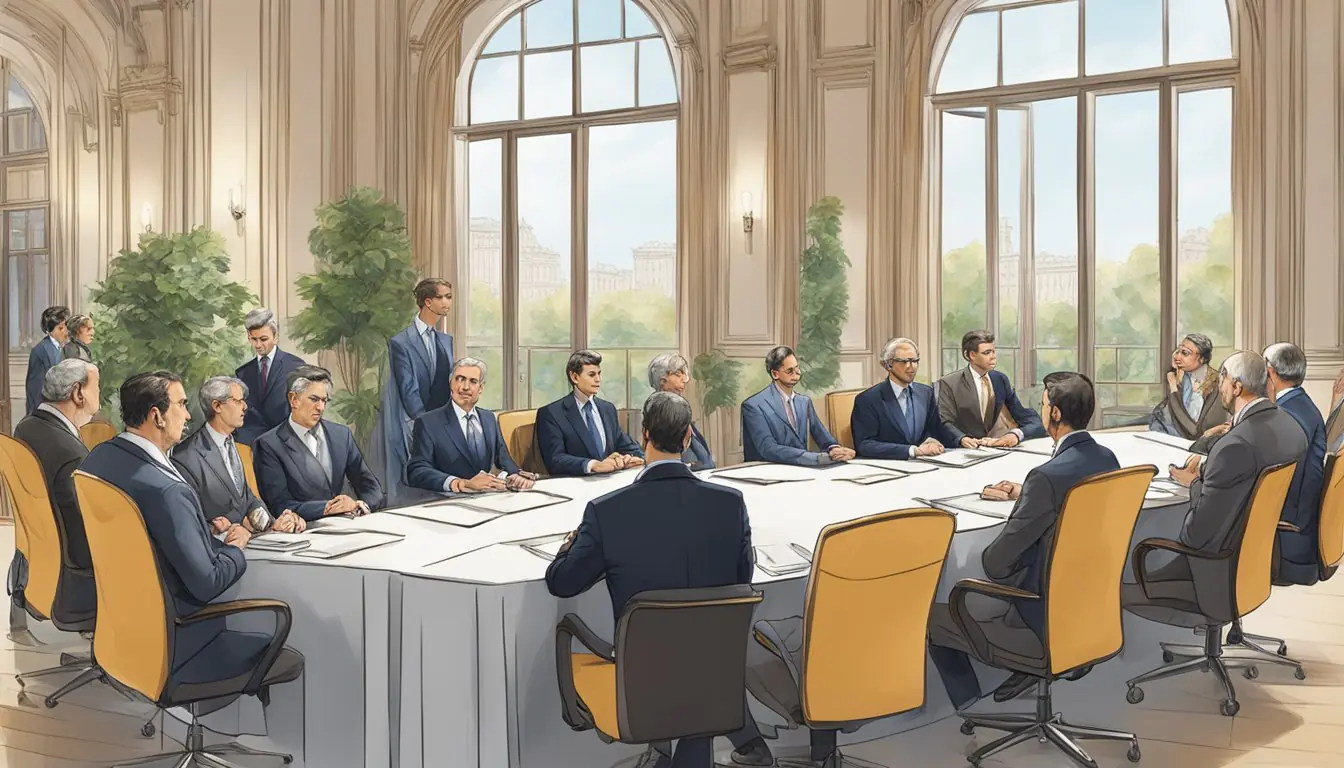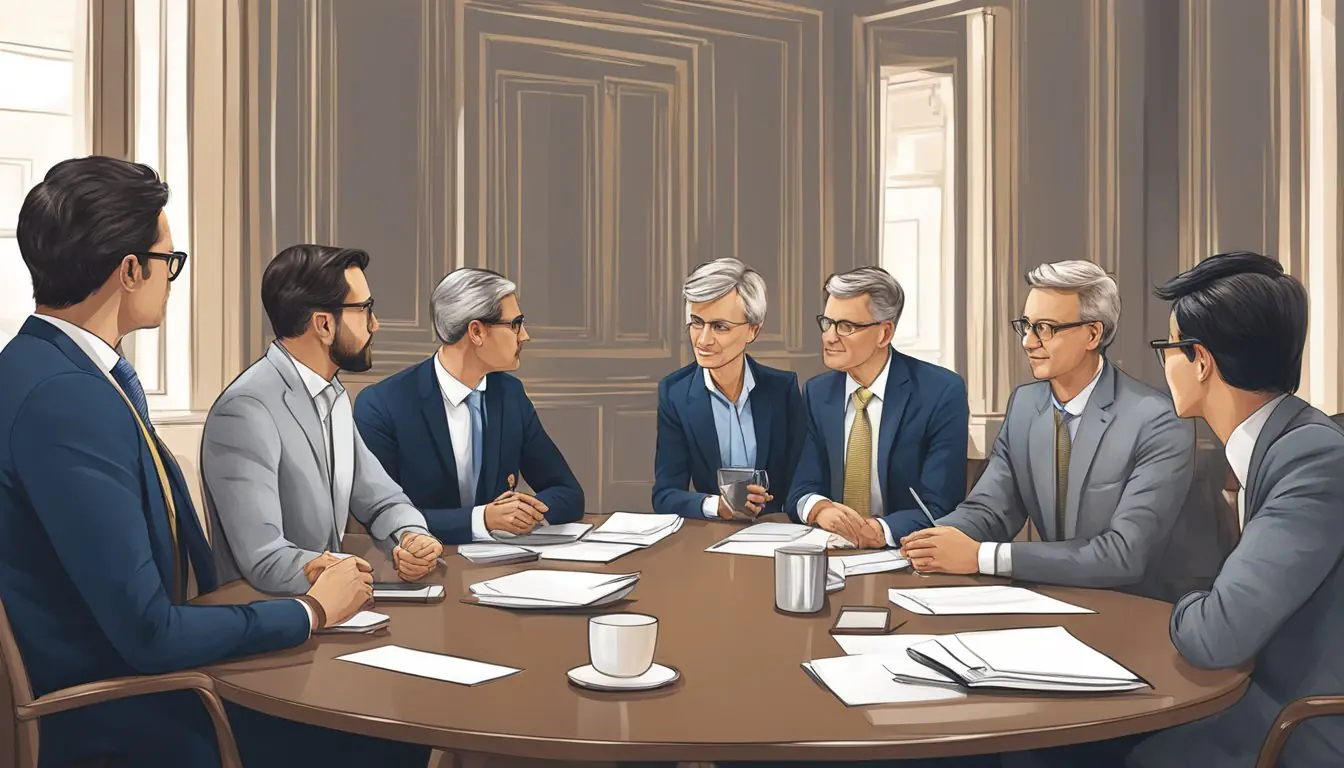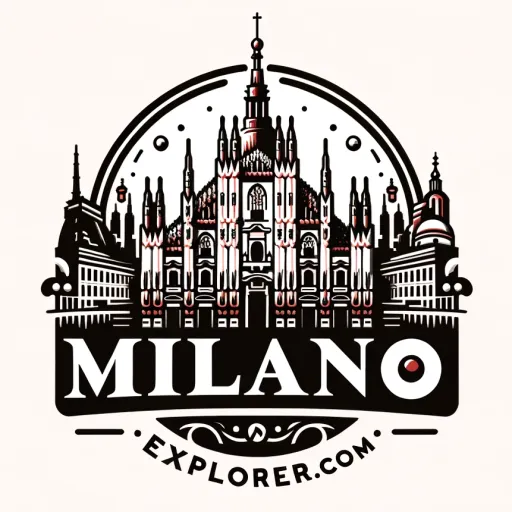Understanding the nuances of business etiquette in Milan is crucial for foreigners looking to establish professional relationships or conduct meetings in this Italian economic hub.
The culture of Italy deeply influences the way businesses operate in Milan, with an emphasis on formality, punctuality, and respect for hierarchy.
Navigating these cultural norms is essential to make a positive impression and foster successful business interactions.

In the domain of professional dress and conduct, appearing polished and conservative is often expected to accompany the importance of building rapport and trust through appropriate social behavior.
Knowing the subtleties of meeting etiquette in Italy can also profoundly impact the outcome of business negotiations, requiring a blend of patience and strategic communication.
Moreover, being aware of legal and ethical considerations will underpin the integrity and credibility of any business dealings within this historic city.
Business Etiquette in Milan
Key Takeaways
- Adherence to formal business etiquette is essential in Milan.
- Professional dress and a strategic approach to meetings are highly valued.
- Knowledge of Italian legal and ethical business standards supports successful interactions.
Italian Business Culture
Italian business culture is characterized by a careful balance between formality and personal connection, with respect paid to hierarchy. Understanding nuances in business etiquette and the importance of networking can greatly influence successful interactions.
Understanding Italian Business Etiquette
In Italy, business meetings are often underlined by a strong sense of formality.
Respect for hierarchy is paramount, with decisions frequently made at the top.
It is crucial for foreigners to acknowledge this structure to foster trust and facilitate smoother negotiations.
Punctuality is expected despite the Italian approach to time often being more flexible than international standards.
Starting meetings with a firm handshake and a direct gaze signifies confidence and respect.
Business communication in Italy may include a mix of direct and indirect cues, requiring foreigners to be adept at reading between the lines.
Italian business etiquette demands that you pay close attention to body language and tone, as these provide important social cues.
Formal attire is expected in business contexts, with a great emphasis on dressing smartly to make a good impression.
Forming Relationships and Networking in Italy
Establishing a solid relationship is a cornerstone of doing business in Italy.
Italians place a high value on personal relationships and trust, favoring long-term partnerships over short-term gains.
Networking often occurs in social settings, with lunch breaks being an opportune time to cultivate connections.
Exchanging business cards is a standard practice that is done with both hands as a sign of respect.
Corporate social responsibility is also a growing concern in Italian firms, reflecting a dedication to ethical practices and societal welfare.
When introduced, it is respectful to refer to colleagues and clients with their proper titles, respecting the social hierarchy at all times.
Professional Dress and Conduct
In Milan’s corporate environment, attention to fashion and dress code is paramount, intertwined with polite and professional behavior to foster successful business interactions.
Italian Dress Code and Style
Italian fashion is acknowledged worldwide for its elegance and quality.
In Milan, professionals typically wear formal attire that exudes understated elegance, where classic outfits are preferred for the workplace.
For men, this means tailored suits in neutral colors, while women often wear chic dresses or suits paired with tasteful accessories.
The Milanese work wardrobe puts an emphasis on quality fabrics and precise fits, ensuring that even the most basic ensemble meets high standards of style.
Behavior and Conduct in Business Settings
Conduct in business settings in Milan tends toward the formal.
Punctuality is critical and is seen as a sign of respect.
In meetings, firm handshakes and direct eye contact convey confidence.
A thorough understanding of local business etiquette is important; for example, gift giving should be done thoughtfully, reflecting consideration for the recipient.
Milanese professionals value personal interactions, and networking is considered an art.
Being well-versed in networking etiquette such as appropriate conversation starters and follow-up etiquette can be crucial for foreigners to establish rapport.
Conducting Successful Meetings
Navigating the nuances of corporate etiquette in Milan calls for an understanding of local customs and a show of respect towards Italian business practices.
Acquainting oneself with the predetermined protocols can significantly influence the outcome of professional encounters.
Preparing for Meetings with Italian Planners
Milanese corporate culture values preparation and formality.
Foreigners should gather insights on the Italian planners with whom they are meeting, including understanding the company hierarchy and decision-making process.
It’s prudent to confirm schedules in advance as changes can occur.
Additionally, engaging an interpreter may be beneficial if one is not fluent in Italian, ensuring comprehension for all parties involved.
Meeting Etiquette and Expectations
When attending meetings in Milan, punctuality is imperative; arriving late can be perceived as disrespectful.
The initial focus is often on networking, establishing a rapport with Italian colleagues, and exchanging business cards.
Eye contact should be maintained, signifying trust and sincerity.
Mobile phones should be silenced to avoid disruptions.
If a meeting adjourns to a coffee break or a lunch meeting, understand that these times are extensions of the professional setup and should be treated with the same decorum.
Environmental concerns are increasingly significant in Italy, so demonstrating an awareness of environmental issues may foster a sense of shared values.
Social Aspects of Italian Business
In the bustling corporate environment of Milan, understanding the social intricacies can facilitate smoother interactions and successful business dealings.
Gift Giving and Hospitality
Italian business culture places significant emphasis on relationships, where hospitality and gift-giving are key aspects.
It’s customary to present high-quality gifts as tokens of appreciation; items like fine wine or locally produced specialties are well-received.
However, one must be careful to avoid anything that could be construed as bribery; gifts should be thoughtful, not overly expensive.
For more guidance on suitable business gifts, their meaning, and occasions, consider the insights from Milan Guide – Expat.com.
Navigating Italian Social Events and Leisure
Networking and social events often extend into the realms of leisure and tourism, where understanding the social fabric of Milan is essential.
Engaging clearly and confidently in communication with locals at various events can leverage sustainability initiatives and even enhance the inbound tourism market.
Acknowledging the richness of Milan’s history and showing respect for iconic structures like the cathedral via social media channels can also form part of the dialogue in these settings.
As you attend these social gatherings, knowing the city’s public transport system or the etiquette around cocktails can demonstrate cultural awareness and respect.
Navigating Legal and Ethical Considerations
When conducting business in Milan, understanding the complex legal frameworks and addressing ethical challenges are critical to operating successfully.
Foreigners should be well-informed about local laws and ethical norms that influence business operations, especially in areas such as corruption and corporate social responsibility.
Understanding the Legal Context
Milan’s legal system can be intricate, with various laws affecting business operations.
It is crucial for companies to comply with regulations on corporate governance, taxation, and labor laws to avoid legal repercussions.
Understanding environmental regulations is also vital, as Italy prioritizes the protection of its environment.
Non-compliance could lead to significant legal penalties and harm a company’s reputation.
Companies in Milan must navigate these laws diligently, balancing cost of living adjustments for employees while adhering strictly to the Italian civil code.
Addressing Ethical Challenges
Ethical business conduct in Milan extends beyond adherence to the letter of the law.
There’s an expectation to confront corruption proactively, fostering transparency and accountability in all transactions.
Ethical challenges also include corporate social responsibility (CSR), where businesses are expected to contribute positively to society.
This could involve engaging in fair trade practices, supporting local communities, or minimizing the environmental impact of business activities.
A strong CSR profile can greatly enhance a company’s image and pride itself on ethical standards that resonate with Milanese values.
Career Development in Italy
Career development in Italy intertwines practical work experience with an emphasis on balancing professional responsibilities and personal satisfaction.
The Italian job market offers diverse opportunities for growth through internships and student placements, while also valuing a work-life balance that contributes to overall job satisfaction.
Internships and Student Placements
In Italy, internships are a crucial step for students and recent graduates to gain hands-on experience in their chosen field.
These placements often form a bridge between academic studies and full-time employment, with many Italian companies considering internship experience during the interview process.
Opportunities for internships in Milan are particularly valuable, as the city is known for its dynamic work culture and competitive work environment.
Work-Life Balance and Job Satisfaction
The concept of work-life balance is integral to the Italian workplace. Italians place a strong emphasis on enjoying life outside of work, which in turn reflects positively on job satisfaction rates.
Italian employers recognize the importance of personal time. As a result, many companies in Italy advocate for reasonable working hours alongside opportunities for career advancement.
Business Infrastructure
In Milan, the business infrastructure seamlessly supports a fast-paced corporate environment. It is underpinned by a robust transportation network and a dynamic economic landscape.
Transportation and Logistics
Milan’s public transport system is one of its critical infrastructure strengths, encompassing a comprehensive network of buses, trams, and a metro system affectionately known as the Metropolitana.
For business travelers and local professionals alike, Milano Centrale stands as one of the main railway hubs, offering high-speed connections to domestic and international destinations.
The city’s commitment to efficiency is evident through its cargo and freight services, critical for enterprises operating in this commercial powerhouse.
Finance and Economic Landscape
The financial framework of Milan is both sophisticated and expansive, with the city often referred to as the economic heart of Italy.
Hosting the Italian Stock Exchange, known as Borsa Italiana, Milan is a magnetic center for finance and investment, reinforced by a plethora of banking and financial services institutions.
The city’s fiscal climate is characterized by a strong emphasis on sectors like fashion, design, and manufacturing, drawing a clear picture of a locale where economic initiatives are welcomed and nurtured.
Cultural Insights
In the realm of business etiquette in Milan, appreciating Italy’s rich tapestry of arts and history is paramount for foreigners. This depth of culture extends into the fabric of daily life and influences the corporate environment significantly.
Italian Arts and History
Milan stands as a historical beacon of artistic and architectural excellence, boasting landmarks such as the iconic Milan Cathedral.
Foreign businessmen are expected to show a degree of awareness about Italy’s illustrious past, from its classical roots to Renaissance masterpieces which underscore the city’s importance in the global art and design scene.
This historical context enriches business interactions and is often interwoven with modern corporate discussions. For instance, topics related to Milan’s design leadership could be a respectful nod to the city’s cultural pride.
Modern Italian Lifestyle and Pop Culture
Milan mirrors a balance between traditional Italian culture and a pulsing modern lifestyle evolving with contemporary design and fashion trends.
Forging connections often happens over informal settings such as aperitivos, where beverages like classic Milanese drinks play a role in socializing.
Moreover, understanding Italy’s current cultural shifts, including popular media and entertainment, can bridge gaps and smooth interactions in a corporate milieu.
Acknowledging elements like contemporary Italian culture can contribute positively to relationships and conversation, demonstrating a well-rounded approach to the country’s business environment.
Conclusion

In navigating the business landscape of Milan, professionals must adapt to the local corporate etiquette. It requires an appreciation for punctuality, a grasp of meeting protocols, and an affinity for cultural nuances.
In meetings, individuals should exhibit a respectful yet flexible approach. They are encouraged to be punctual, as this signals respect, and to embrace the local custom of a formal greeting.
The Italian business setting values relationships, hence, social rapport and trust-building are crucial.
One must be prepared to engage in preliminary small talk before diving into business discussions. According to the articles on Business meeting etiquette, a sense of personal connection is often as important as the matter at hand.
Gift-giving, although not mandatory, can be seen as a gesture of goodwill. However, selection needs to be thoughtful, avoiding overly personal or extravagant items.
Acknowledging and adapting to Milan’s specific business practices helps in fostering long-term professional relationships.
Furthermore, one should be aware that networking also plays a key role.
As outlined in Milan’s networking etiquette, a balance between formality and informality can create a conducive atmosphere for successful networking.
Frequently Asked Questions

When attending corporate meetings in Milan, understanding local business etiquette is crucial for foreigners. Dress codes, gift-giving protocols, communication styles, and business card exchanges all carry their own set of expectations. Being aware of these can help ensure a smooth and professional interaction.
What are the appropriate dress codes for corporate meetings in Milan?
In Milan, the dress code for corporate meetings is generally formal.
Men should opt for a dark-colored suit, complemented by a white shirt and tie. Women are expected to wear smart and elegant attire.
Milan’s fashion consciousness means one’s appearance should reflect professionalism and attention to detail.
What protocols should be followed when giving gifts in a business context in Milan?
Gift giving in a business context requires care. It should be done to reflect appreciation and not to be perceived as a bribe.
High-quality, modest gifts such as fine pens or items showcasing one’s company logo can be acceptable, especially when there’s an established relationship. It’s courteous to give gifts at the conclusion of a deal or during the holiday season.
How do U.S. and Italian business cultures differ, particularly in professional interactions?
U.S. and Italian business cultures vary notably; where American interactions may be more direct and task-oriented, Italian business culture places importance on building relationships and may include more soft skills.
In Italy, there’s a higher emphasis on politeness and formality during professional interactions.
Could you outline the key aspects of communication etiquette in a professional setting in Italy?
Communication in a professional setting in Italy calls for a balance between formality and warmth.
Initial meetings may be formal, with titles used appropriately, but as relationships develop, communication can become more personal. Non-verbal cues like hand gestures and facial expressions are significant in conveying one’s message.
What are the customary practices for exchanging business cards in Italy?
Exchanging business cards in Italy is a standard formal procedure that occurs at the beginning of the meeting.
It is done with both hands or the right hand (never with the left), and taking a moment to examine the card before putting it away is a sign of respect. Ensure your business card includes your title and any advanced degrees.
What should one expect in terms of business entertainment and dining etiquette in Milan?
Business entertainment and dining play a key role in Milanese business culture.
Dinners may be used to discuss business but are often social events aimed at establishing rapport.
Punctuality is appreciated, and one should observe the local dining etiquette.
For example, starting to eat only after the host does and toasting when appropriate.
